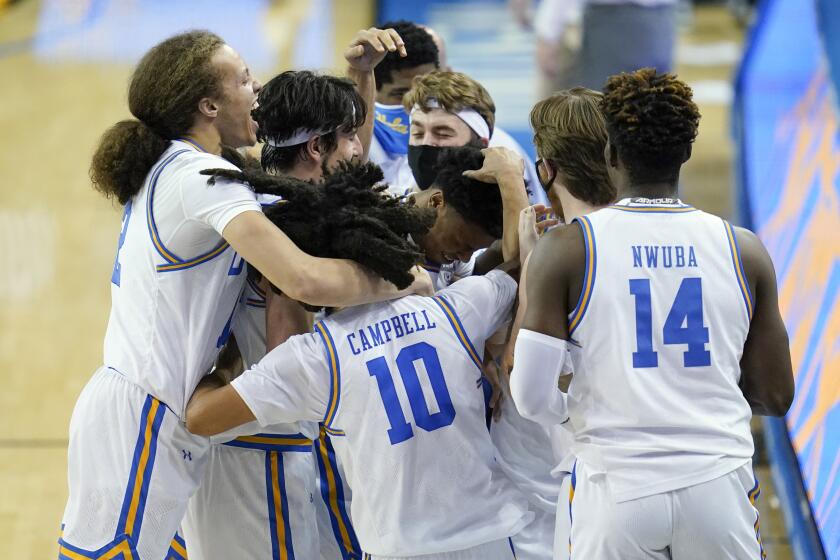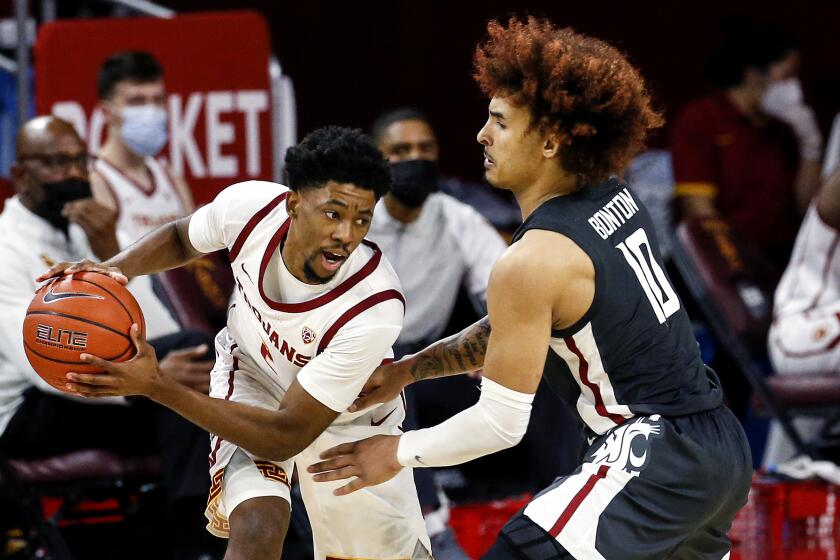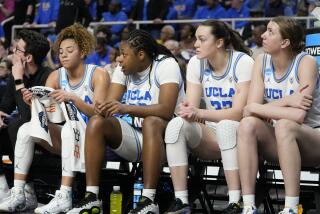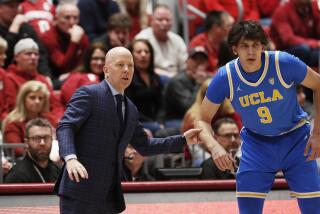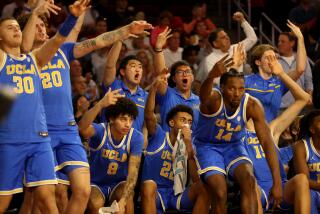Planting more fertile seeds before NCAA tournament is goal for UCLA, USC
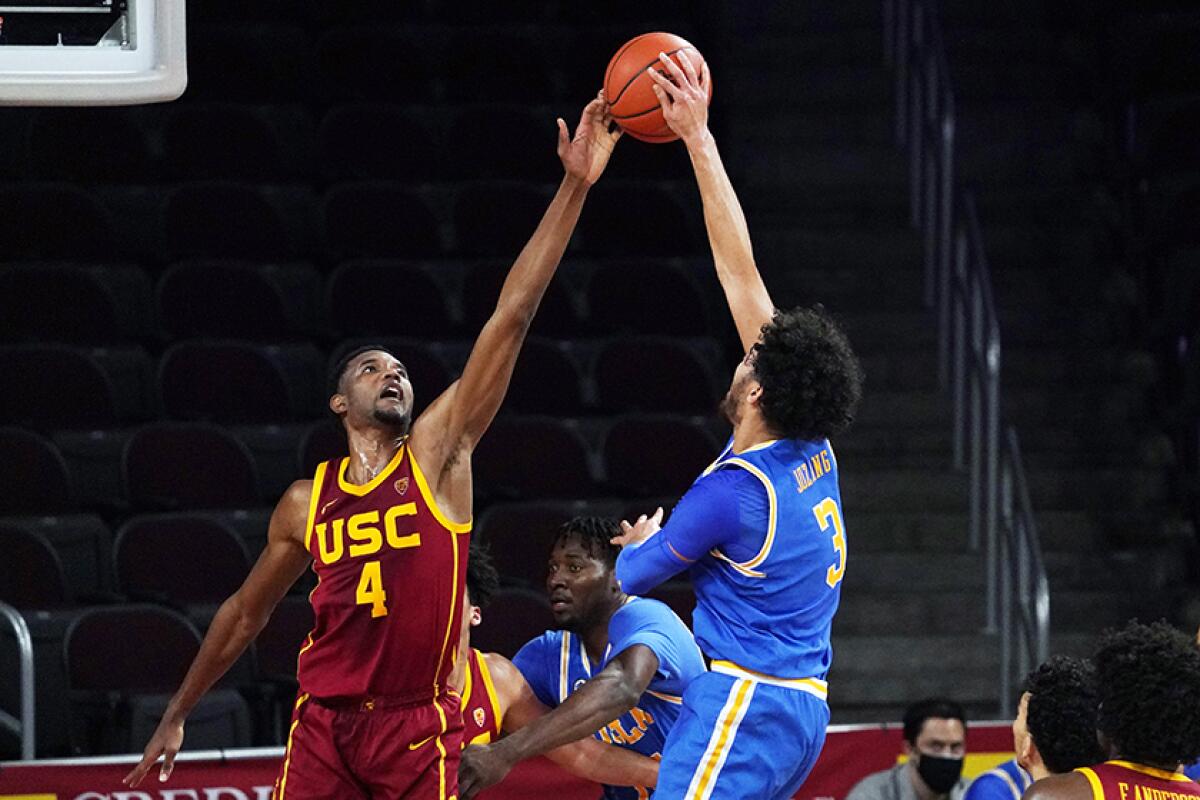
Here’s some friendly advice for those grumbling about UCLA’s NCAA tournament projections: Hold on a minute.
Alone atop the Pac-12 Conference but predicted as a middling No. 8 seed by ESPN’s Joe Lunardi and CBS Sports’ Jerry Palm, the two most prominent analysts who forecast NCAA tournament brackets, the Bruins could considerably boost their standing thanks to a schedule that closes with a flurry of tough matchups.
After playing at Colorado on Saturday, UCLA (17-5 overall, 13-3 Pac-12) will face Oregon on Wednesday in another road game before closing the regular season against No. 19 USC at Pauley Pavilion on March 6.
“Those are all Quad 1 games,” Lunardi said Friday, referring to the most valuable kind for NCAA tournament seeding purposes because they come against highly rated teams according to the metrics of the tournament selection committee. “So [win] two or three of them and we could be seeing a significant jump. If UCLA was really to run the table and win it outright and maybe get to the final of the Pac-12 tournament, I would say an outside chance at a four [seed].”
Since tearing a knee ligament in December, senior guard Chris Smith has become UCLA’s biggest fan. He says the Bruins can make a long run in the NCAA tournament.
Fans grousing about UCLA facing an uphill slog toward a so-called protected seed need to consider two factors. First, the Bruins logged no marquee nonconference wins, losing to Ohio State and San Diego State. Second, they play in a conference that’s perceived to be weak, with USC the only team nationally ranked.
“This is going to sound really arrogant — I don’t think it’s a perception,” Lunardi said. “It’s been based largely on nonconference performance and tournament performance in recent years.”
The Pac-12 won 73.2% of its nonconference games, ranking fifth among major conferences, while going 0-6 against ranked opponents. Compounding matters, March has led only to sadness for the Pac-12 since Arizona won the national title in 1997, the conference sending only one team to the Final Four since 2008.
As of now, both Lunardi and Palm have four Pac-12 teams making the NCAA tournament, with Colorado and Oregon joining UCLA and USC. Palm also listed Stanford among his “first four out.”
“Everybody in the Pac-12,” Palm said, “is hurt by the Pac-12’s relative lack of strength.”
Graduate transfer Tajh Eaddy is one of the major reasons USC is in first place in the Pac-12. The point guard is averaging 17.4 points a game in February.
If it’s any comfort for the Bruins, both prognosticators said they’re a lock to make their first NCAA tournament appearance since losing to St. Bonaventure in a play-in game in 2018.
“I think it’s 100% that they’re in the field,” Lunardi said, “and 90% that they’re in the main bracket.”
When it comes to USC, Lunardi likes the Trojans — he really likes them.
“I think that SC is absolutely on the short list of Final Four sleepers,” Lunardi said of the Trojans (19-5, 13-4), who are half a game behind UCLA in the conference standings. “They’ve been playing so well and they have a lottery pick [in Evan Mobley], which history would show goes a long way toward advancing in the tournament.”
Lunardi has the Trojans listed as a No. 5 seed in his most recent projections but said they could go as high as No. 3 “if everything broke perfectly.” Palm has USC as a No. 7 seed but noted they could go two or three spots higher.
UCLA UP NEXT
AT COLORADO
When: Saturday 7 p.m. PST.
Where: CU Events Center, Boulder, Colo.
On the air: TV: ESPN2; Radio: 570.
Update: The Buffaloes (18-7, 12-6) will be plenty motivated to beat the Bruins considering they’ve lost the last three meetings between the teams, including a particularly galling setback last season in Boulder on senior day. One statistic to keep in mind if the game is close in the final minutes is that Colorado has made 83.1% of its free throws, putting it on track to beat the NCAA Division I record of 82.2% that Harvard set during the 1983-84 season.
More to Read
Go beyond the scoreboard
Get the latest on L.A.'s teams in the daily Sports Report newsletter.
You may occasionally receive promotional content from the Los Angeles Times.

